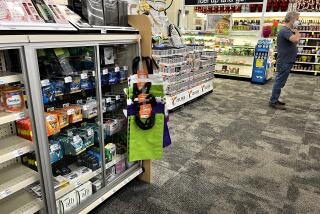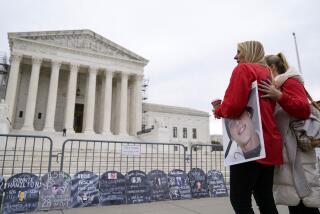Financier Seeking NL Industries Challenges Ploy in Court : ‘Poison Pill’ Takeover Defense Put to New Test
- Share via
NEW YORK — U.S. companies watched closely last fall when the Delaware Supreme Court ruled that Household International’s plan to avoid an unwanted takeover, a plan dubbed the “poison pill,” was legal.
Household was considered a bellwether case because many companies are incorporated in Delaware, and the state’s courts have widespread influence in business law.
Thus, when Household’s pill was upheld, Joseph H. Flom, a prominent Wall Street takeover lawyer, predicted, “There is going to be a proliferation of these pills.”
He was right. Dozens of other major concerns, including Martin Marietta, NCR and Goodyear Tire & Rubber, have since adopted similar plans.
Yet even as the pill became the takeover defense of choice, controversy about its legality continued.
Not surprisingly, then, the poison pill is again being tested in court. And corporate America is again watching closely.
The latest challenge came from Dallas financier Harold C. Simmons, who launched a hostile takeover of NL Industries Inc., a chemicals and energy services company that adopted a poison pill in April.
U.S. District Judge Vincent L. Broderick in New York, acting on Simmons’ lawsuit, ruled last week that NL’s pill was illegal.
NL promptly appealed. Broderick’s decision “is inconsistent with precedent in the area and misinterprets the applicable law,” said James Fogelson, a lawyer for Wachtell, Lipton, Rosen & Katz, the law firm that helped popularize the pill.
Poison pills attempt to make a hostile takeover so expensive as to discourage the bidder from even trying.
Companies say the pill is useful because it deters offers that they believe are inadequate or unfair for shareholders. Most companies adopt pills without receiving shareholder approval.
Critics say poison pills give management too much power, allowing it to discriminate against bidders and to take away shareholders’ ability to decide whether an offer is fair.
Issued Special Rights
The plans typically are set in motion like this: Once a hostile bidder acquires 20% of a company, or makes a tender offer for 30%, the company’s stockholders are issued special rights.
If the company succumbs to a hostile takeover, the rights allow their holders to buy shares in either the target company or the acquiring company for half price--an expensive proposition for the bidder.
Management can redeem the rights--in a friendly deal, for example--until the pill is triggered; after that, they often cannot be redeemed for a certain period, sometimes many years.
Simmons had triggered NL’s pill, for example, by initially acquiring 27% of its stock. And late Friday, Simmons said he lifted his stake to a controlling 51.1%.
But Simmons’ lawyer said Simmons would not interfere in NL’s appeal of Broderick’s decision. Even if Simmons now takes control of NL’s board, the board cannot redeem NL’s poison pill. So Simmons apparently is hoping the appeals court will void the pill by upholding Broderick’s ruling.
Following the Delaware decision, many companies designed pills using Household’s plan as a foundation and then added their own wrinkles, and it was NL’s wrinkles that troubled Judge Broderick.
Household’s plan is known as a “flip-over.” If the pill has been triggered and the company then falls to a hostile takeover by another company, the rights issued to stockholders allow them to “flip over” and buy stock in the acquiring company for half price.
NL not only has a flip-over but also a “flip-in” provision, which comes into play if NL is the surviving entity.
In this case, holders can buy NL stock for half price--except for the hostile bidder, namely Simmons, who is excluded from doing so. That would automatically dilute his existing stake, and voting rights, in NL.
Broderick said that exclusion was discriminatory and hence illegal because New Jersey law prohibits discrimination among holders of the same class of stock. NL is incorporated in New Jersey.
Broderick also ruled that since the pill was triggered and cannot be redeemed for 10 years, NL shut off any chance that Simmons or anyone else could make an offer.
He said that was “a disservice to the shareholders who are entitled to exercise their own value judgments with respect to the worth or lack of worth” of an offer.
‘Reasonable Defense’
Broderick said Household’s pill, by contrast, left room for an offer to at least be made, even if it fails. But NL’s board, he said, “abdicated future control or responsibility with respect to tender offers by simply making them impossible.”
When Household’s pill was challenged, the company did not face an actual takeover threat. The Delaware court said Household’s pill was a “reasonable defensive mechanism” so as not to leave the company vulnerable to “coercive acquisition techniques.”
But the court also emphasized that Household’s directors still had a duty to get the best offer for stockholders and that the pill’s use in a takeover would be “evaluated when and if the issue arises.”
NL, meanwhile, argued among other things that Simmons knew its pill’s provisions when he triggered it, and thus he should not be able to complain about its consequences in court. NL will take its argument before the U.S. Court of Appeals on Aug. 28.
More to Read
Inside the business of entertainment
The Wide Shot brings you news, analysis and insights on everything from streaming wars to production — and what it all means for the future.
You may occasionally receive promotional content from the Los Angeles Times.










